Servicios Personalizados
Articulo
Indicadores
Links relacionados
-
 Citado por Google
Citado por Google -
 Similares en Google
Similares en Google
Compartir
South African Journal of Science
versión On-line ISSN 1996-7489
versión impresa ISSN 0038-2353
S. Afr. j. sci. vol.113 no.9-10 Pretoria sep./oct. 2017
http://dx.doi.org/10.17159/sajs.2017/a0229
COMMENTARY
The Extended BSc Programme: Performance of students in Chemistry
C. Robert Dennis; Rina Meintjes; Charlene Marais; Ricky Versteeg; Jannie C. Swarts
Department of Chemistry, University of the Free State, Bloemfontein, South Africa
Keywords: school performance profiles; graduates
Admission to study for a BSc degree at South African universities is determined by a student's performance in the final Grade-12 National Senior Certificate (NSC) examination. These entrance requirements are:
- a specific admission point (AP score), calculated from the subject achievement levels obtained in the final Grade-12 NSC examination;
- a degree endorsement; and
- specific achievement or performance levels in Mathematics and Physical Sciences.
The current entrance requirements1 for a BSc degree at the University of the Free State (UFS) are:
- a NSC Grade-12 certificate with a degree endorsement;
- a minimum AP score of 30;
- an achievement Level 4 in the Grade-12 language of instruction;
- Grade-12 Mathematics at a minimum achievement Level 5; and
- Grade-12 Physical Sciences at a minimum achievement Level 4 and/or Grade-12 Life Sciences at a minimum achievement Level 5.
The requirement of Physical Sciences and/or Life Sciences is dependent on specific study programmes.
To cater for school-leavers who do not meet these entrance requirements1, the UFS implemented the Extended BSc Programme (for those with AP scores of 25 to 29) in 2005 to complement the very successful science stream of the University Preparation Programme (UPP)2-4 (for those with AP scores of 20 to 24). In 2011, the Extended BSc Programme was moved from the Bloemfontein Campus of the UFS to the South Campus where the UPP has been situated since 2009.
In the first year of study in the Extended BSc Programme, students initially had to register for 32 mainstream credits in Chemistry and 32 foundation Mathematics credits, similarly to the UPP2,4 Students also had to register for development modules in Academic Literacy, Concepts in General Science and Introduction to Computer Usage. In 2011, the module 'Concepts in General Science' was replaced by the module 'Skills and Competencies for Life Long Learning: Natural Science'. Mainstream credits in Biology have been added to the first year of the programme since 2014 to bring the Extended BSc Programme on a par with the Extended Degree Programmes in other faculties of the UFS.
The current entrance requirements1 for the Extended BSc Programme are:
- a minimum AP score of 25 with a degree endorsement;
- Grade-12 NSC Mathematics at a minimum achievement Level 3;
- Grade-12 Physical Sciences at a minimum achievement Level 3 or Life Sciences at a minimum achievement Level 4; and
- the language of instruction at a Grade-12 minimum achievement Level 4.
Currently, students in the Extended BSc Programme register in the first year of study for 8 developmental/foundation credits as well as 24 mainstream credits in Chemistry, 24 mainstream credits in Biology and 32 foundation Mathematics credits, similarly to that in the UPP2,4 Students also register for three development modules: Academic Language; Skills and Competencies for Life Long Learning: Natural Science; and Computer Literacy. An Extended BSc student who has passed all the modules of the first year of the programme can proceed to register for the second year of the programme on the Bloemfontein Campus.
Since the inception of the Extended BSc Programme in 2005 in the Faculty of Natural and Agricultural Science at the UFS, 2995 students have registered for the programme. From the available student data and the entrance requirements, student profiles regarding school achievement levels in Mathematics and Physical Sciences in relation to the AP score have been constructed. These student profiles indicate that some students achieved the required AP score for mainstream study but failed to achieve the required mathematics and science requirements. On the other hand, some students obtained the required mathematics and science achievement level for mainstream study but did not obtain the required AP score. However, the majority of the students, did not meet any of the entrance requirements for mainstream graduate studies.
Until 2012, students in the Faculty of Natural and Agricultural Sciences at the UFS wrote proficiency tests during the first week of their first year of study. These tests included a pre-calculus test5, a general thinking skills test, as well as Chemistry and Physics proficiency tests. The latter two were based on the expected knowledge students should have obtained during their Grade 11 and 12 Physical Sciences studies. Our interest, however, is in the students' performance in Chemistry and therefore we only considered the performance in the Chemistry proficiency test.
The Chemistry proficiency test, overall, yielded very poor results. Figure 1 shows the average performance of students in the Extended BSc Programme in the Chemistry proficiency test in relation to their final Grade-12 examination achievement in Physical Sciences. The average proficiency test mark is almost similar for the various school achievement levels. However, students with a Senior Certificate higher-grade school achievement in Physical Sciences performed marginally better in the Chemistry proficiency test, while the performances of students with a Senior Certificate standard-grade achievement and a NSC achievement level almost corresponded.
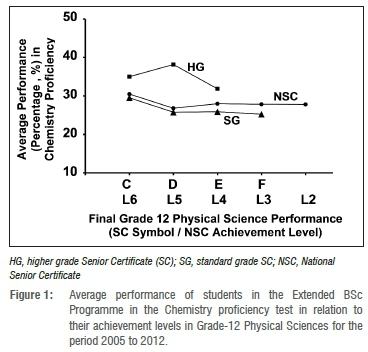
The performance of students in the Chemistry modules within the Extended BSc Programme is of relevance in this study. In 2005 - the first year of the programme - 134 students registered for CEM108, a 32-credit Chemistry module. Of these students, 36.5% passed the CEM108 module. In 2006, the CEM108 module was split into two 16-credit modules, i.e. CHE104 (Inorganic and Analytical Chemistry) and CHE194 (Physical and Organic Chemistry). The performance of the 1149 students registered for these modules during 2006 to 2010 is presented in Figure 2. The pass rates for the CHE104 and CHE194 modules were 55.4% and 61.4%, respectively. The marginally better performance in CHE194 could be the result to the fact that CHE104 was a prerequisite for CHE194.
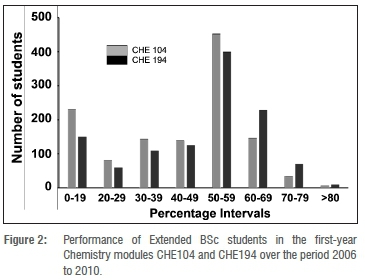
In 2011, first-year Chemistry for the Extended BSc Programme was split into four modules: CHE112 (Introduction to Chemistry: A foundation module) and CHE132 (Organic Chemistry) in the first semester, and CHE122 (Physical Chemistry) and CHE142 (Inorganic and Analytical Chemistry) in the second semester. CHE112 contributed 8 foundation credits, whereas the other three each contributed 8 mainstream credits. Because of administrative restructuring at the UFS in 2014, the module codes were changed as follows: CHE112 to CHEM1552, CHE132 to CHEM1532, CHE122 to CHEM1622 and CHE142 to CHEM1642. The first semester CHEM1552 and CHEM1532 modules, as well as either the foundation Mathematics module, MATD1554, or an achievement Level 4 in Mathematics in the final Grade-12 NSC examination, are prerequisites for the second semester CHEM1622 module, whereas CHEM1532 is excluded as a prerequisite for CHEM1642. The students in the Extended BSc Programme performed satisfactorily in these first-year Chemistry modules (Figure 3). For the period 2011 to 2015, the pass rates for the first-semester CHEM1552 and CHEM1532 modules were 92.1% and 81.2%, respectively, and the pass rates for the second-semester CHEM1622 and CHEM1642 modules were 88.8% and 87.0%, respectively. It is interesting to note that the BSc Extended students performed better than the UPP students4 in the first semester (92.1% vs 84% for CHEM1552; 81.2% vs 77.7% for CHEM1532), but that the UPP students were on par with the BSc Extended students in the second semester (87.9% vs 87.0% for CHEM1642; 91.1% vs 88.8% for CHEM1622).
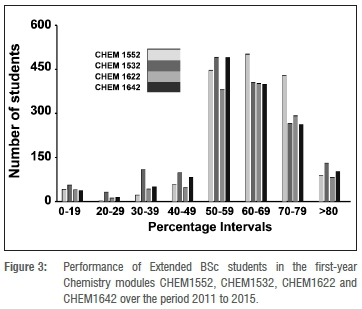
Of the 2995 students in the Extended BSc programme during the period 2005 to 2015, 14.0% registered for at least one second-year Chemistry module. The reason why some students registered for only one Chemistry module can be ascribed to some degree programmes in the Faculty of Natural and Agricultural Sciences requiring only a specific Chemistry module. The performance of the Extended BSc students in the second-year Chemistry modules is given in Figure 4. The pass rates for the first-semester modules CHEM2614 (Physical Chemistry) and CHEM2632 (Analytical Chemistry) were 71.2% and 80.8%, respectively, and the pass rates for the second semester modules CHEM2642 (Inorganic Chemistry) and CHEM2624 (Organic Chemistry) were 89.0% and 57.6%, respectively.
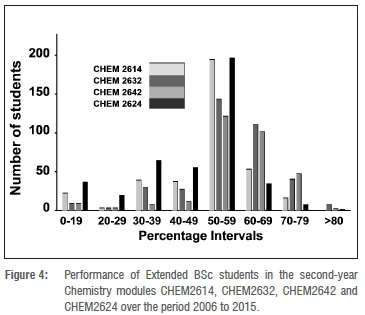
Only 6.5% of the 2995 Extended BSc students over the sample period registered for at least one third-year Chemistry module. The pass rates in the first-semester third-year modules CHEM3714 (Analytical Chemistry) and CHEM3734 (Physical Chemistry) were 86.5% and 79.5%, respectively, and the pass rates for the second-semester third-year modules CHEM3724 (Inorganic Chemistry) and CHEM3744 (Organic Chemistry) were 68.4% and 72.4%, respectively. Figure 5 shows the performance of the students in the four third- year Chemistry modules.
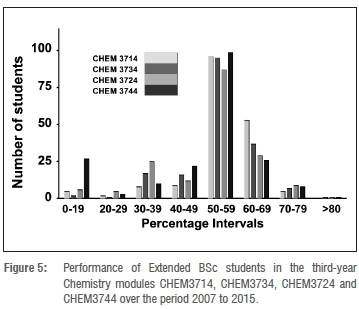
The success of the programme is measured in terms of the number of students who graduate. Of the 2995 students, 20.3% (609 students) obtained a first degree over the sample period. Of these, 486 students (16.2%) obtained a first degree in the Faculty of Natural and Agricultural Sciences and 123 students (4.1%) registered in other faculties after the first year in the programme and obtained a first degree in those faculties. Table 1 shows the number of first degree graduates in the different study programmes. Of the graduates, 135 proceeded to an honours degree and 15 of those completed a master's degree. No student in this sample completed PhD study. A number of the graduates chose education as a career and proceeded to a Postgraduate Certificate in Education; 42 graduates (1.4%) obtained this postgraduate teaching certificate.
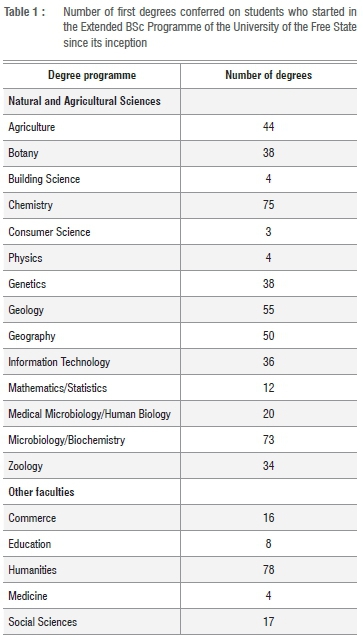
Our interest, however, is the performance in, and outcomes regarding Chemistry. The above-mentioned statistics show the performance of the students in the Extended BSc Programme in Chemistry over the past 10 years. Of the 2995 students in the programme during the sample period, 75 students (2.5%) obtained a BSc degree majoring in Chemistry (Table 1). Because only Chemistry had modules eligible for mainstream credits in the first year of the programme in the period 2005-2013, it was expected that the Chemistry course would benefit a great deal more from the programme. Factors like Mathematics prerequisites and facility constraints for Chemistry had a direct effect on the number of Chemistry graduates.
Of the 75 Chemistry graduates, only 11 students proceeded with Chemistry and obtained an honours degree in Chemistry. Four of these honours graduates proceeded towards a MSC degree in Chemistry.
The Chemistry department and the Faculty of Natural and Agricultural Sciences of the UFS are proud of what has been achieved with the Extended BSc Programme. The fact that 609 first degrees and 165 postgraduate degrees and certificates have been conferred on students who started in the Extended BSc Programme since inception of the programme, underlines the success of the Extended BSc Programme of the UFS.
The Extended Degree Programmes of the UFS offer an opportunity to students who, as a consequence of personal challenges and also limitations in the school system, did not meet the entrance requirements to graduate studies, to proceed into graduate study after a one-year access programme. Congratulations are in order to the staff of the UFS who developed the Extended Degree Access Programmes, for providing the youth of South Africa with an opportunity to build themselves a promising career.
Acknowledgement
We thank Annemari Eksteen and Jacques Botha of the Directorate for Institutional Research and Academic Planning at the UFS for their help with the compilation of the data.
References
1. University of the Free State. Faculty of Natural and Agricultural Sciences: Yearbooks [homepage on the Internet]. No date [cited 2017 May 28]. Available from: http://www.ufs.ac.za/natagri/faculty-of-natural-and-agricultural-sciences-home/academic-information/yearbooks [ Links ]
2. Hay HR, Marais F. Bridging programmes: Gain, pain or all in vain. S Afr J High Educ. 2004;18(2):59-75. http://dx.doi.org/10.4314/sajhe.v18i2.25454 [ Links ]
3. Rabie NE. Access to higher education: The case of the Career Preparation Programme at the University of the Free State [mini thesis]. Cape Town: University of the Western Cape; 2008. [ Links ]
4. Marais C, Meintjes R, Dennis CR, Swarts JC. Performance in Chemistry of students who started in the University Preparation Programme: The ripple effect. S Afr J Sci. 2016;112(7/8), Art. #a0162, 3 pages. http://dx.doi.org/10.17159/sajs.2016/a0162 [ Links ]
5. Dennis CR, Murray DM. Success in first-year mathematics: School-leaving examinations and first-year performance. S Afr J Sci. 2012;108(7/8), Art. #1325, 3 pages. http://dx.doi.org/10.4102/sajs.v108i7/8.1325 [ Links ]
 Correspondence:
Correspondence:
C. Robert Dennis
crobbie.dennis@gmail.com














